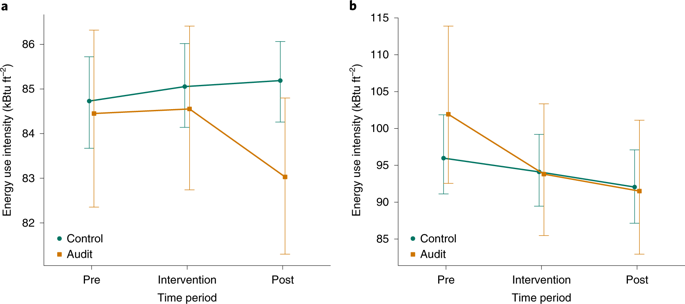Nature Energy ( IF 49.7 ) Pub Date : 2020-03-30 , DOI: 10.1038/s41560-020-0589-6 Constantine E. Kontokosta , Danielle Spiegel-Feld , Sokratis Papadopoulos

|
Cities are increasingly adopting energy policies that reduce information asymmetries and knowledge gaps through data transparency, including energy disclosure and mandatory audit requirements for existing buildings. Although such audits impose non-trivial costs on building owners, their energy use impacts have not been empirically evaluated. Here we examine the effect of a large-scale mandatory audit policy—New York City’s Local Law 87—on building energy use, using detailed audit and energy data between 2011 and 2016 for approximately 4,000 buildings. This specific policy context, in which the compliance year is randomly assigned, provides a unique opportunity to explore the audit effect without the self-selection bias found in studies of voluntary audit policies. We find energy use reductions of approximately –2.5% for multifamily residential buildings and –4.9% for office buildings. The results suggest that mandatory audits, by themselves, create an insufficient incentive to invest in energy efficiency at the scale needed to meet citywide carbon-reduction goals.
中文翻译:

强制性能源审核对建筑能源使用的影响
城市越来越多地采用能源政策,以通过数据透明性减少信息不对称和知识差距,包括能源公开和对现有建筑物的强制审核要求。尽管此类审核对建筑物所有者施加了不小的成本,但尚未通过经验评估其对能源使用的影响。在这里,我们使用2011年至2016年之间约4,000座建筑物的详细审计和能源数据,研究了大规模强制性审计政策(纽约市的《地方法》第87条)对建筑能耗的影响。这种特殊的政策环境(随机分配合规年度)为探索审计效果提供了独特的机会,而没有在自愿审计政策研究中发现的自选偏见。我们发现能源消耗减少了大约–2。多户住宅建筑为5%,办公建筑为–4.9%。结果表明,强制审核本身不足以激励能源效率达到实现全市减碳目标所需的规模。











































 京公网安备 11010802027423号
京公网安备 11010802027423号